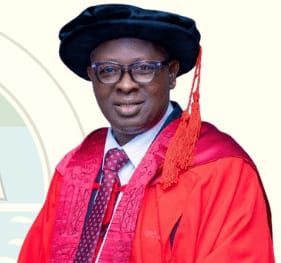
A Professor of Haematology and Blood Transfusion at the College of Medicine, University of Lagos, Sulaimon Akanmu, has recommended that the Federal Ministry of Health and the National Agency for the Control of AIDS adopt fourth-generation screening kits for testing of Human Immunodeficiency Virus antibodies if the country must achieve epidemic control.
Akanmu, who is a Consultant Haematologist at the Lagos University Teaching Hospital, recommended this on Wednesday while delivering the 14th Inaugural lecture for the 2023/2024 academic session of the institution.
In his lecture titled, “The virus and the malnourished red cells: It is only a matter of time; Humanity is set to have the last laugh over the virus,” the don chronicled the faces of HIV/AIDS and the mortality and morbidity associated with the dreaded the disease in its early days.
The haematologist also recounted the role anaemia played in causing the mortality and morbidity associated with HIV infection in its early days, stating that what most authorities including the World Health Organisation did not recognise early was that mortality due to the occurrence of AIDS-defining illness was largely predictable by the presence of anaemia or not.
He noted that in the early days of HIV infection, a major predictor of death in severely immuno-HIV-infected adult patients was anaemia.
He explained that the reason why anaemia was so prevalent in HIV-infected persons was that HIV malnourished the red cells.
According to him, anaemia was so common in HIV-infected patients to the extent that the definition of anaemia in the setting of HIV infection has to be modified as compared with the standard definition.
The professor added that science has always been one step ahead of the virus, disclosing that the advent of Antiretroviral Therapy provided a pillar of hope.
Akanmu assured all that the days of HIV infection as a dreaded disease are numbered, affirming that with effective use of ARTs by persons living with HIV, Nigeria and the rest of the world would be able to get to a point where no new infection will occur—epidemic control.
The former president of the Nigerian Society for Haematology and Blood Transfusion, said, “What the virus has done to humanity, God almighty has given humanity the knowledge to be able to tackle the virus.
” I spoke about what we call achieving epidemic control by which we mean that with effective use of retroviral therapy, we would be able to get to a point where no new infection will occur.
“ Because everybody that is HIV infected and is on effective ARTs will be incapable of infecting another person and when that happens, it will be the beginning of what we refer to as epidemic control.”
The Sustainable Development Goal 3.3 calls for ending the AIDS epidemic by 2030, which involves a reduction in incidence worldwide.
HIV epidemic control is defined by the World Health Organisation as the reduction of disease incidence, prevalence, morbidity, and/or mortality to a locally acceptable level as a result of deliberate efforts.
Giving insight into the importance of achieving HIV epidemic control which he said was possible through effective use of ARTs, Akanmu said, “Effective ART adds at least 33 years to the life span of persons living with HIV on therapy.
“Since viral load becomes undetectable, it is calculated that a person living with HIV on effective treatment will be able to infect less than one person in 33 years.
These are metrics, and more are now being achieved in many countries and very soon in Nigeria too.
“ That is why we say the Incidence Prevalence Ratio of 1/33 must be achieved. The day we achieve that is it is the day we will say indeed, we have arrived at the destination where we would say we have truly achieved epidemic control. But that also implies that we must be able to say that no new infection is occurring.”
He added, “Except we can say that, you probably will not be able to say you have achieved epidemic control and before you can say that no new infection is coming, you must be able to say whoever is testing positive is a new infection or is not a new infection.
“And the technology that we can use to determine when somebody is newly infected or is not newly infected is what I suggested as a very strong recommendation to the Federal Ministry of Health and NACA.
“We can only do that if the country adopts what we call fourth-generation screening kits for testing of HIV antibodies moving forward in the country.”
According to NACA, 1.8 million persons are estimated to be living with HIV in Nigeria, out of which about 1.63 million are already on the lifesaving medication of ARV.
Akanmu who has an interesting and fulfilling career in haematology and blood transfusion said his journey into the world of HIV Medicine began in 1987 when HIV was a dreaded disease with no antiretroviral agents available except for one or two people who were already placed on a monotherapy antiretroviral drug the AZT(Azido-thymidine) from the United States.
“ It dates back to 1987 when the WHO proclaimed that HIV is transmissible by blood and blood products and must be added to the list of transmissible infections. The WHO also prescribed that the method for the screening of blood should be the use of the so-called Enzyme-Linked Immunosorbent Assay (ELISA)”, he added.
The Vice-Chancellor of UNILAG, Prof. Folasade Ogunsola, while commending Akanmu for delivering an insightful and excellent lecture, described him as an outstanding scholar who has added value to his field of study and humanity over the years.

